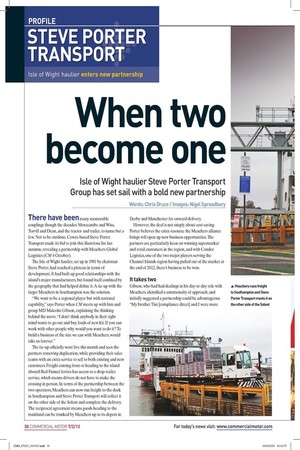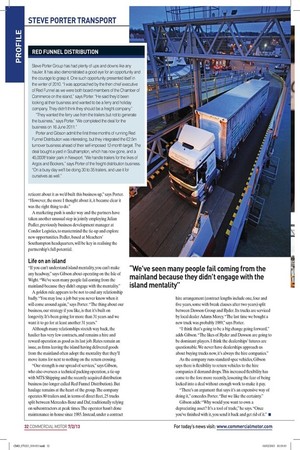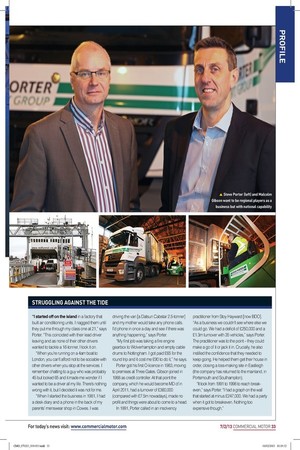When two become one
Page 23

Page 25

Page 26

If you've noticed an error in this article please click here to report it so we can fix it.
Isle of Wight haulier Steve Porter Transport Group has set sail with a bold new partnership Voru.: Chr. .u‘.e Images: Nigel Sp adbury There have been many memorable couplings though the decades: Morecambe and Wise, Torvill and Dean, and the tractor and trailer, to name but a few. Not to be outdone, Cowes-based Steve Porter Transport made its bid to join this illustrious list last autumn, revealing a partnership with Meachers Global Logistics (CM 4 October).
The Isle of Wight haulier, set up in 1981 by chairman Steve Porter, had reached a plateau in terms of development. It had built up good relationships with the island's major manufacturers, but found itself confined by the geography that had helped define it. A tie-up with the larger Meachers in Southampton was the solution.
"We want to be a regional player but with national capability," says Porter when CM meets up with him and group MD Malcolm Gibson, explaining the thinking behind the move. "I don't think anybody in their right mind wants to go out and buy loads of new kit. If you can work with other people why would you want to do it? To build a business of the size we can with Meachers, would take us forever."
The tie-up officially went live this month and sees the partners removing duplication, while providing their sales teams with an extra service to sell to both existing and new customers. Freight coming from or heading to the island aboard Red Funnel ferries has access to a drop-trailer service, which means drivers do not have to make the crossing in person. In terms of the partnership between the two operators, Meachers can now run freight to the dock in Southampton and Steve Porter Transport will collect it on the other side of the Solent and complete the delivery. The reciprocal agreement means goods heading to the mainland can be trunked by Meachers up to its depots in Derby and Manchester for onward delivery.
However, the deal is not simply about cost-saving. Porter believes the extra resource the Meachers alliance brings will open up new business opportunities. The partners are particularly keen on winning supermarket and retail customers in the region, and with Condor Logistics, one of the two major players serving the Channel Islands region having pulled out of the market at the end of 2012, there's business to be won.
It takes two Gibson, who had had dealings in his day-to-day role with Meachers, identified a commonalty of approach, and initially suggested a partnership could be advantageous. "My brother Tim [compliance direct] and I were more reticent about it as we'd built this business up," says Porter. "However, the more I thought about it, it became clear it was the right thing to do."
A marketing push is under way and the partners have taken another unusual step in jointly employing Julian Pedler, previously business development manager at Condor Logistics, to mastermind the tie-up and explore new opportunities. Pedler, based at Meachers' Southampton headquarters, will be key in realising the partnership's full potential.
Life on an island "If you can't understand island mentality, you can't make any headway," says Gibson about operating on the Isle of Wight. "We've seen many people fail coming from the mainland because they didn't engage with the mentality."
A golden rule appears to be not to end any relationship badly. "You may lose a job but you never know when it will come around again," says Porter. "The thing about our business, our strategy if you like, is that it's built on longevity. It's been going for more than 31 years and we want it to go for at least another 31 years."
Although many relationships stretch way back, the haulier has very few contracts, and remains a hire and reward operation as good as its last job. Rates remain an issue, as firms leaving the island having delivered goods from the mainland often adopt the mentality that they'll move items for next to nothing on the return crossing.
"Our strength is our spread of services," says Gibson, who also oversees a technical packing operation, a tie-up with MTS Shipping and the recently acquired distribution business (no longer called Red Funnel Distribution). But haulage remains at the heart of the group. The company operates 80 trailers and, in terms of direct fleet, 25 trucks split between Mercedes-Benz and Daf, traditionally relying on subcontractors at peak times. The operator hasn't done maintenance in-house since 1985. Instead, under a contract hire arrangement (contract lengths include one, four and five years, some with break clauses after two years) split between Dawson Group and Ryder. Its trucks are serviced by local dealer Adams Morey. "The last time we bought a new truck was probably 1989," says Porter.
"I think that's going to be a big change going forward," adds Gibson. "The likes of Ryder and Dawson are going to be dominant players I think the dealerships' futures are questionable. We never have dealerships approach us about buying trucks now, it's always the hire companies."
As the company runs standard-spec vehicles, Gibson says there is flexibility to return vehicles to the hire companies if demand drops. This increased flexibility has come to the fore more recently, lessening the fear of being locked into a deal without enough work to make it pay.
"There's an argument that says it's an expensive way of doing it," concedes Porter. "But we like the certainty."
Gibson adds: "Why would you want to own a depreciating asset? It's a tool of trade," he says. "Once you've finished with it, you send it back and get rid of it." • RED FUNNEL DISTRIBUTION Steve Porter Group has had plenty of ups and downs like any haulier. It has also demonstrated a good eye for an opportunity and the courage to grasp it. One such opportunity presented itself in the winter of 2010. "I was approached by the then chief executive of Red Funnel as we were both board members of the Chamber of Commerce on the island," says Porter. "He said they'd been looking at their business and wanted to be a ferry and holiday company. They didn't think they should be a freight company."
"They wanted the ferry use from the trailers but not to generate the business," says Porter. "We completed the deal for the business on 16 June 2011."
Porter and Gibson admit the first three months of running Red Funnel Distribution was interesting, but they integrated the £2.5m turnover business ahead of their self-imposed 12-month target. The deal bought a yard in Southampton, which has now gone, and a 45,000fftrailer park in Newport. "We handle trailers for the likes of Argos and Bookers," says Porter of the freight distribution business. "On a busy day we'll be doing 30 to 35 trailers, and use it for ourselves as well."
STRUGGLING AGAINST THE TIDE "I started off on the island in a factory that built air conditioning units. I nagged them until they put me through my class one at 21," says Porter. "This coincided with their lead driver leaving and as none of their other drivers wanted to tackle a 16-tonner, I took it on.
"When you're running on a 4am boat to London, you can't afford not to be sociable with other drivers when you stop at the services. I remember chatting to a guy who was probably 45 but looked 65 and it made me wonder if I wanted to be a driver all my life. There's nothing wrong with it, but I decided it was not for me.
"When I started the business in 1981, I had a desk diary and a phone in the back of my parents' menswear shop in Cowes. I was driving the van [a Datsun Cabstar 2.54onner] and my mother would take any phone calls. I'd phone in once a day and see if there was anything happening," says Porter.
"My first job was taking a fire engine gearbox to Wolverhampton and empty cable drums to Nottingham. I got paid £65 for the round trip and it cost me £90 to do it," he says.
Porter got his first 0-licence in 1983, moving to premises at Three Gates. Gibson joined in 1988 as credit controller. At that point the company, which he would become MD of in April 2011, had a turnover of £360,000 (compared with £7.5m nowadays), made no profit and things were about to come to a head.
In 1991, Porter called in an insolvency practitioner from Stoy Hayward [now BD0]. "As a business we couldn't see where else we could go. We had a deficit of £250,000 and a £1.3m turnover with 35 vehicles," says Porter. The practitioner was to the point —they could make a go of it or jack it in. Crucially, he also instilled the confidence that they needed to keep going. He helped them get their house in order, closing a loss-making site in Eastleigh (the company has returned to the mainland, in Portsmouth and Southampton).
"It took from 1991 to 1998 to reach breakeven," says Porter. "I had a graph on the wall that started at minus £247,000. We had a party when it got to breakeven. Nothing too expensive though."








































